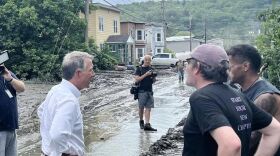A number of statewide organizations are stepping in to help farmers that have been impacted by last week’s flooding in Vermont. They are acting even as officials move to get federal and state support to the agriculture sector.
Vermont Lieutenant Governor David Zuckerman is a Progressive who oversees the state Senate when it is in session. Outside the Statehouse he is an organic vegetable farmer in Hinesburg. Zuckerman says he’s feeling some survivor’s guilt because his Full Moon Farm avoided the flooding.
“We’ve survived. We’ve got our own damages from the ongoing wet spells, diseases and nutrient loss in the soils. But it’s hard to complain when I still have some stuff I can harvest and not everything was underwater.”
Zuckerman once farmed in Burlington’s Intervale and experienced flooding there. He says the entire planting season has been destroyed for those who were flooded last week.
“One of the most grueling aspects is that you’re going to harvest nothing and yet you still have to go out and keep working even though you’ve got nothing to show for it in the bank. And it’s emotionally really hard. You’re out there where two weeks ago you were looking at bean plants that you were going to hopefully harvest green beans the next week. And they’re just gone or they’re covered in glop so you’re still seeing what could have been. But it’s a huge amount of work. And if the water’s gotten up into your equipment shed or your barn then that’s just a whole ‘nother level of mess because it can ruin hundreds of thousands of dollars of tractors and implements if you don’t get them really clean.”
As farmers began assessing damage, a number of groups started fundraising. NOFA-VT announced that donations to its Farmer Emergency Fund would go to impacted farms. Executive Director Grace Oedel explains the fund originated during Tropical Storm Irene to get immediate grants to help farmers rebuild.
“Depending on how much federal aid there is available, these are funds that are super flexible. They could help people get through until that aid comes. They could help people just make ends meet until they figure out another plan or do a rebuild project. There’s a lot of layers of implication here. How are farm workers going to be paid through the whole season? What’s going to happen if people have committed crops? What’s going to happen in the rebuild phase? So there’s just an enormous need for support right now.”
Farmers will be able to apply for federal and state aid. During a virtual briefing Monday, Farm Service Agency State Executive Director John Roberts said flooded farmers could be eligible for a number of programs.
“I have some early reports. We’re looking at, across the counties, about 7,000 acres so far of mixed crops. There has been some livestock loss, particularly chickens. We do have a number of programs like the Livestock Indemnity Program and the ELAP Program which is emergency assistance for livestock. I had a call from a honey producer down near Ludlow on the Black River whose hives were swept away and we will be working with him to help him. There are a number of programs but reporting damage is the number one step and the sooner the better.”
Vermont Congresswoman Becca Balint, a Democrat in her first term, says she is working with her Senate counterparts to get relief. She spoke on WAMC’s Congressional Corner.
“It is going to be a situation where we are going to be looking at any bill that’s a must-pass bill and seeing how we can get some relief to Vermonters, and Vermont farmers in particular, given the situation that we’re in right now.”
The Vermont Agency of Agriculture has a webpage on flood recovery resources for farmers and farm communities.












